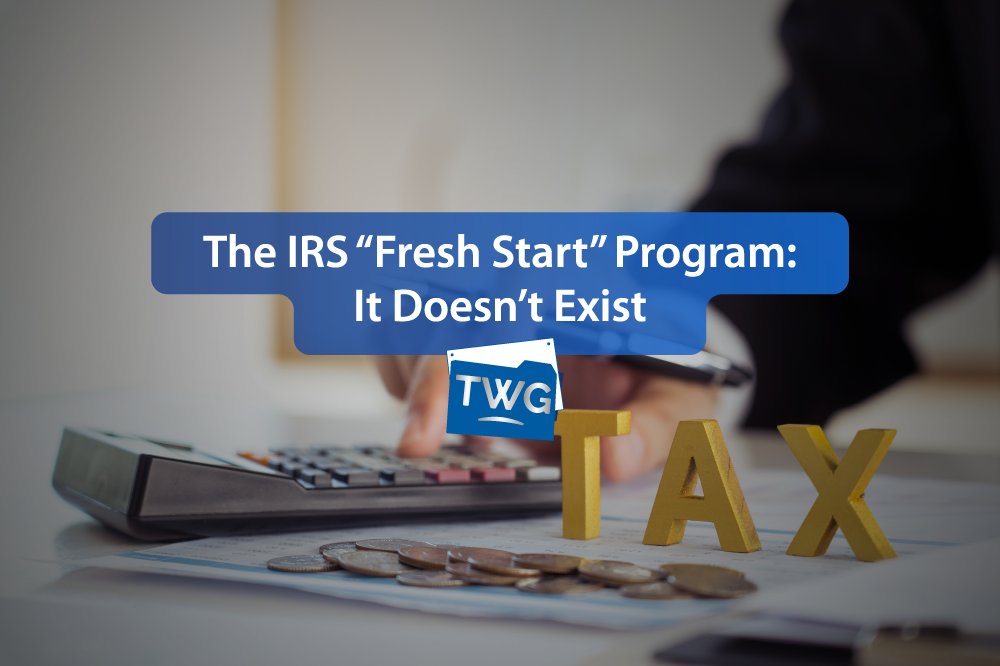There is not now and there never has been an IRS Fresh Start Program. None. Nada. If anyone tells you different, they’re selling false hopes of utopia and you’re the prospective payor. Let’s start with a bit of background.
The IRS started using the optimistic and somewhat friendly sounding catchphrase “Fresh Start” with a brief press release back in 2011, announcing “a series of initiatives to help people get a fresh start with their tax liabilities.” There was no particular program you could apply for or be accepted in. There was no particular action for you to take. Instead, the words invited a dialog about resolution in general, using any one or a combination of an already existent number of collection resolution options.
In reality, and for example, “fresh start” consisted of some procedural changes to those resolution options by:
- raising the thresholds of liability that would cause tax lien filings;
- making a few changes to the process of withdrawing a tax lien;
- authorizing payments under installment agreements to be made by direct debit; and
- raising some of the thresholds of income for taxpayers to submit offers in compromise (offers of settlement for less than the total amount owed).
Even more of these kinds of changes were made in the years since, and few if any have survived. At some point after several years, the IRS simply stopped using that language, maybe because it sounded too friendly and non-confrontational.
You’d never know this if you listen to the sales pitches of a number of tax practitioners, as if they have some kind of exclusive inside information, questioning whether you “qualify” for the “newly-offered” (and you’d better act quickly if you want to get into it) “IRS Fresh Start Program”. Unfortunately, it’s become a common “come-on” to get you in the door, only to then find out that the same-as-always tax relief options are indeed the same as they always were. The reality is that there is no new or old IRS program or procedure that you may be or might have been eligible for. Instead, your basic options or choices are:
- Protest the asserted liability. Formulating, strategizing, and presenting a protest of liability asserted by the IRS is an arena where the extent of substantive familiarity and experience of a qualified advisor of the underlying issues as well as of the particular IRS offices and officials who will be considering your matter are important in spades. And that’s where the breadth and depth of the Tax Workout Group We encourage you to shop and compare our straight talk — no need to look between the lines to decipher where competence ends and puffing begins.
- Negotiate an installment payment agreement or submit an offer in compromise. Payment plans, or installment agreements, are common, but some of the subtle ins-and-outs are not. And it’s on those subtleties that the Tax Workout Group Proper posturing of a proposal can make a considerable difference in such significant ways. An example? Knowledge of the published IRS “financial standards” is essential, but knowledge of their unpublished flex points is critical.
- Pay the amount in question. Simple solution, huh? Well, it is an option.
- Eliminate the tax claims in bankruptcy and pay the least amount possible. Yes, discharging tax liabilities in bankruptcy may indeed be a viable option, one that is most often missed or purposefully passed over because it requires a more sophisticated analysis and practice experience that others simply do not have — see https://taxworkoutgroup.com/blog/precision-tax-we-saved-their-client-thousands as a clear example.
Our tax-bankruptcy attorneys are experts in IRS practice and procedure and the interrelationship between federal and state tax laws and the US Bankruptcy Code. In each case, we start with a comprehensive review of the client’s tax history, of the factual detail and timing of each tax-item event, and we plug that information into a sophisticated software system that we have developed and carefully refined over years of handling these kinds of matters, to produce what we call a Tax Dischargeability Analysis. And that’s not just a fancier name for a summary of conclusions. No, it’s quite a bit more:
- a full statement of each relevant tax-item factor;
- an analysis of the impact of each relevant factor individually as well as in conjunction with the others;
- a pro/con analysis of alternative resolution paths considered;
- a statement of our conclusions regarding the path(s) we recommend; and
- a roadmap of how we got there.
Yes, we’re proud of our Tax Dischargeability Analysis. It allows us to achieve the best possible result by filing the most appropriate type of bankruptcy at the most optimal time in order to eliminate the maximum amount of tax claims, penalties, and interest, along with all other dischargeable debt.
The professionals at the Tax Workout Group are not new to any of these matters. We’ve been addressing, refining, and streamlining our approach with years of quality experience — there’s simply no need to draw you in on false claims of a new silver bullet when our advice and guidance are seasoned with the tried, tested, and true. Symbolically, playing Blackjack with a full six-deck shoe skewers much better odds toward the player than cutting off a deck or two at the beginning that the player will never see. Let us review your tax situation, which we’ll do for free, and show you what’s truly possible.
